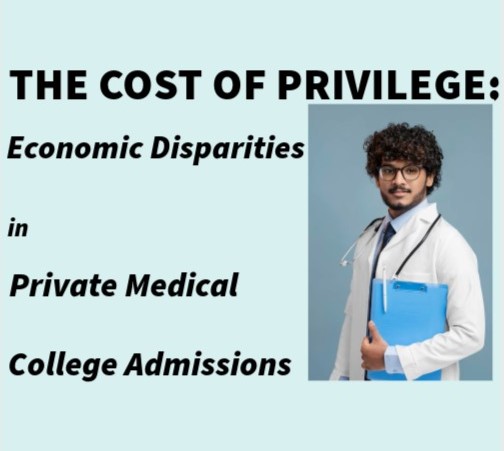This phenomenon of “reservation for the rich” underscores the troubling trend where financial capacity trumps merit in accessing quality medical education.
By Ayesha Sultana
The current state of medical education in India starkly highlights the economic disparities that plague the admission process, particularly in private medical colleges. This issue is exemplified by a recent incident where a student, scoring 110 out of 720 on the NEET exam with a ranking of 11,91,412, secured a medical seat solely due to the ability to pay an exorbitant fee of 1 to 1.5 crore rupees. Conversely, another student with a significantly higher score of 500/720 was forced to pursue medical education abroad because they couldn’t afford the steep fees of private institutions in India.
This phenomenon of “reservation for the rich” underscores the troubling trend where financial capacity trumps merit in accessing quality medical education. Private medical colleges, which should ideally serve as institutions of learning based on merit, increasingly cater to those who can afford their high fees, thereby marginalizing deserving students who lack financial resources.
Beyond individual cases, this system perpetuates a broader socio-economic divide. Wealthier families can secure educational opportunities that pave the way for high-paying careers in medicine, while less affluent but equally capable students face significant hurdles. This not only affects the personal ambitions of these students but also has long-term implications for the medical profession in India, potentially skewing it towards those from affluent backgrounds.
The exorbitant fees charged by private medical colleges also raise concerns about the motivations and priorities of these institutions. When educational seats become commodities to be bought, the focus shifts from nurturing skilled and compassionate healthcare professionals to merely generating revenue. This commercialization of medical education can undermine the overall quality and integrity of healthcare services in the long run.
Addressing this issue requires systemic reforms. Policies that ensure greater transparency in the admission process, stricter regulations on fee structures, and increased support for merit-based scholarships are essential steps towards making medical education more accessible and equitable. Additionally, expanding the number of government medical colleges and improving their infrastructure can provide more opportunities for deserving students to pursue their medical aspirations within the country.
Ultimately, the goal should be to create a medical education system that values and rewards merit, fosters diversity, and produces highly competent healthcare professionals committed to serving the community. Only by addressing these economic disparities can India hope to build a more inclusive and effective healthcare system.




